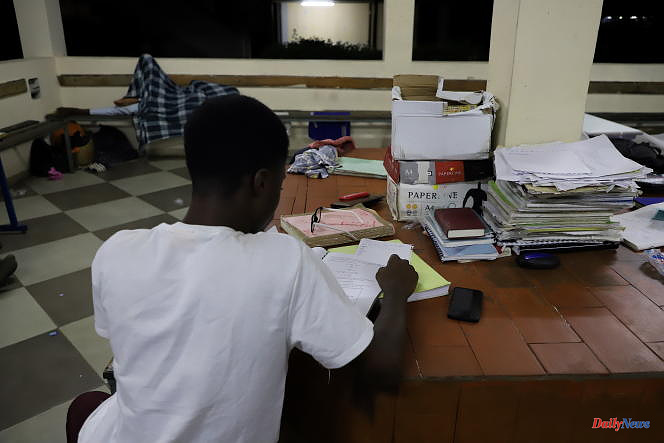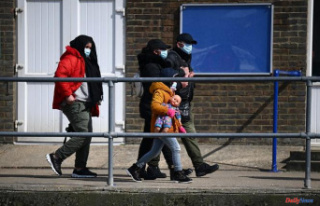It's 2 a.m. at Félix-Houphouët-Boigny University in Abidjan, the largest in Côte d'Ivoire, but the entire campus isn't asleep. Some take advantage of the coolness of the night, the calm and the quality of the connection to revise their composition, while others relax by listening to music. In the amphitheatres still lit, a handful of students still have their heads in their notebooks. At their feet, dozens of sleepers are lying on mats, covered with a light blanket for the best equipped.
Most are waiting for accommodation. Here, they are called "Koso" or "Kosovars", in reference to the Kosovo war in the late 1990s. comparison with their homeless comrades, says Eric*. He sleeps alone in a locked classroom due to his class representative status. "I'm there a few days a month to be able to work on the compositions without the noise of the family at home and not to waste time in transport," he explains. Stop sleeping on a bench.
The student in master 2 of psychology considers himself lucky all the same. Not far from his room, about fifteen young men are sparingly installed on a terrace, for some for more than a year. On the small tiled surface mingle mats, clothes that dry and tables to revise. "I applied but couldn't get a room, so I laid down here while I waited. This is not a normal situation, we should all have the right to housing, "laments Hervé *, student in license 2 of plastic arts.
Some do not come from Abidjan and have been entrusted to a guardian in town, "but life is expensive here, so accommodation is far from the center, the daily round trip is far too tiring and I don't have enough money for transport", says Emmanuel*, in the first year of a bachelor's degree in mathematics and computer science.
Considered squatters
Despite the calm and the cool evening air, everyone suffers from this precariousness. "Right now it's raining hard almost every night, all of our stuff is soaking wet," Emmanuel continues. "To be sure of getting a room, either you join the Fesci [Fédération estudiantine et scolaire de Côte d'Ivoire], or you have to pay an exorbitant sum, between 200,000 and 400,000 CFA francs [from 300 to 600 euros] “, assures Gustave *, also in license 1 of math-info, while the cost of a student room is supposed to be 3,000 CFA francs per month.
Added to this is the violence of the student union, which does not hesitate to show its muscles to increase its number of members. "It's been three nights that members of Fesci have come to wake us up at 2 or 3 in the morning so that we can join their section. They promise us rooms in exchange, when we know that is not true,” complains Emmanuel, who fears their coming the next nights because of the collective refusal of the “Kosovars” on the terrace.
For the university administration, they are considered squatters. A growing phenomenon that challenged Adama Diawara, the Minister of Higher Education, who has put in place measures to solve the problem. The administration has carried out night rounds several times to identify these students. In 2021, 311 of them, gathered in a collective, were thus housed on the Vridi campus, south of Abidjan. Recently, a second wave of 232 students were supported. But the phenomenon persists.
"Students who have not been selected for housing now think that this is the solution to get a room, it's an endless spiral", develops Mamadou Dély, director general of the Regional Center for Works universities (CROU), in charge of the thorny issue of student housing. He advocates the closing of amphitheaters from a certain time to discourage squatters.
Sometimes ten or fifteen per room
But other places have been invested. The courtyards in particular, where dozens of "Kosovars" also manage there with the minimum. Noël*, in his first year of math-info, shares his cardboard bed with a friend under a mosquito net. The one who had plans to join the National Polytechnic Institute of Yamoussoukro failed the entrance exam and continued his studies at the university. "I still haven't found a room, so I'm waiting here." Sometimes I miss an assignment because of a bad night. But I will fight, I often work late to get out of this situation as soon as possible,” he explains. Because the administration ensures that good students and those who meet the age criteria will be prioritized.
The "Kosovars" interviewed also point to housing that has been occupied for several years by civil servants or families who sometimes have no connection with the university. "To make money, some students rent their room and go live in a friend's room," concedes Mamadou Dély, who says he fights this problem.
It was under one of the courtyards similar to that of Christmas that the two students found dead at the start of the year lived, one drowned and the other hanged. This has raised many questions about the mental health of students, which is beginning to be taken into account by the administration.
According to Mamadou Dely, there would currently be 7,000 beds for students at Felix-Houphouët-Boigny University, which has nearly 65,000 students. “We are in the process of building amphitheatres and accommodation for around 1,000 additional beds, assures the director general of the CROU. But nowhere in the world will you see that all students are housed by a public university. It is estimated that a third of students manage to find accommodation in the various housing estates on campus. They are sometimes ten or fifteen per room, in conditions of great precariousness and promiscuity. Here too, the students came up with a name for these undeclared roommates: "Cambodians".












